September 8, 2009
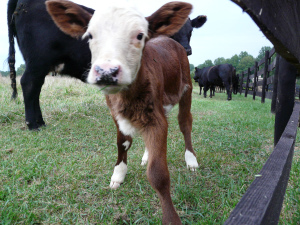 Spent the afternoon swimming, and then cavorting with the cows. My conclusion: I live in a house with twenty-two humans, none of whom have gazed deeply into my eyes, sneezed into my face, smelled my breath, leaned their weight against me – I have met none of their children, nor have I scratched their backs or behind their ears. They have not licked my fingers, or followed me on walks.
Spent the afternoon swimming, and then cavorting with the cows. My conclusion: I live in a house with twenty-two humans, none of whom have gazed deeply into my eyes, sneezed into my face, smelled my breath, leaned their weight against me – I have met none of their children, nor have I scratched their backs or behind their ears. They have not licked my fingers, or followed me on walks.
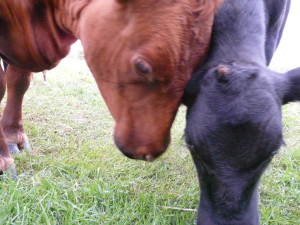
I couldn’t help but contrast the relationship: imagine having that intensity of intimacy in an interaction with a fellow resident, and then slaughtering them and eating them.
You see, it’s just not right.
And that’s why tonight for dinner all I had to eat was boiled egg noodles
and boiled frozen peas.
The carnivores had…wait….wait…turkey pancakes.
The best I can figure is that our nation’s almost-mascot was ground up, pressed into slices of processed luncheon meat, and then the deli slices were put into a blender and then mixed with some breadcrumbs and fried. I’d never seen turkey pancakes before. Pretty interesting.
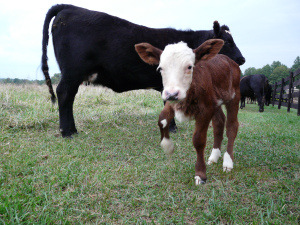
I went to visit with the cows after dinner. Perhaps it was because my ancient human DNA felt a longing for beef, especially after the boiled egg noodles. Nothing like watching and coming close to the mystery of a cow. So engaged, so beautiful, so sensual. Very womanly, certainly holy. Sad. Like Joan Armantrading’s voice: rich and heavy and intense. They wanted to smell my breath – I was grateful it didn’t smell like cow flesh. 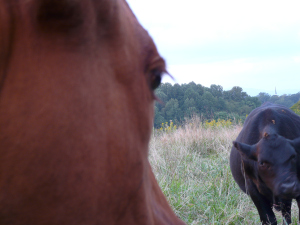
To teach a fellow being to trust, to come close, share food, share shelter, with the full intention of systematic destruction to the family unit…not cool.
For a while, we just stood there and smelled each other. It was companionable. They could probably smell the tasty vegetables – a painter from New York and I hopped up from the dining table, and jumped the electric fence to run over to the organic garden, harvesting two blouses full of fresh yellow cherry tomatoes to add to our noodles and peas.
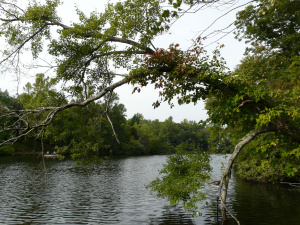 Earlier, we wrapped up the afternoon’s work with a sojourn across the road to the former plantation now known as Sweet Briar College. One of the plantation family’s granddaughter’s died at fifteen, and her mother willed the entire estate to become a women’s college. It’s quite beautiful – quiet and dark today as rain drew in, with a lake the likes of which I’ve never seen before. Thick and black and cool, like a witches’ brew.
Earlier, we wrapped up the afternoon’s work with a sojourn across the road to the former plantation now known as Sweet Briar College. One of the plantation family’s granddaughter’s died at fifteen, and her mother willed the entire estate to become a women’s college. It’s quite beautiful – quiet and dark today as rain drew in, with a lake the likes of which I’ve never seen before. Thick and black and cool, like a witches’ brew.
It’s been forty years since a Wikswo has swum in this lake – I spit into it, just to make sure it recognized me. I think it did. My father grew up as a little boy swimming here, catching his breath on the floating dock. Along with the aunts. My grandmother taught mathematics here, after Harvard/Radcliff denied her a PhD because she was a woman. 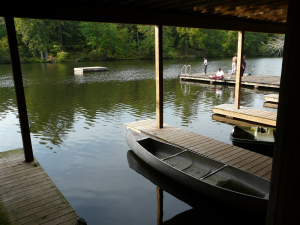
I look forward to many more days at Sweet Briar – it seems like a complicated and intriguing place that shifts itself into many different faces. It always makes me a little snappish when people ridicule the concept of a women’s university. Perhaps a women’s school is dreadfully intimidating, when you get right up there close to it. As we drove through the main campus entrance at sundown and wound through old growth oak groves, it seemed classically mystical, and set apart in ways that felt intriguing. Like Sweet Briar, none of these residencies yet have had more than one or two men – similarly to yoga practice, where the female prevails. 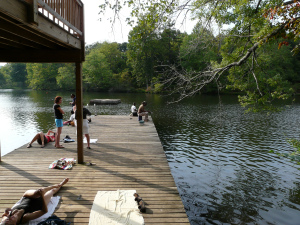
These have all been wonderful sororities, where our shared world doesn’t revolve around shopping, sex, and babies, but rather unimpeded self-expression, professional growth and development, the pursuit of dreams, and the creative impulse. What would have been selfish or unheard of now makes us privileged. It’s just a little more hustle for a privilege to become a right.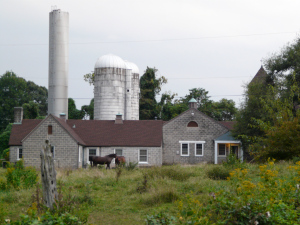
Back to work for the evening, which means a half-light bike ride over to my studio at the barn. The horses standing around as if taking a break from their projects as well, perhaps a painting, and a composition for an experimental harpsichord quintet.
In my corner of the barn, I’m disassembling the novel, Kerosene, and quite enjoying it. Like the lake, I feel the characters are happy to have me back. After all the hardships of the last few years that took away my novelist’s gestalt, it has felt like a homecoming to spend time with my own words rather than the words others need me to write. And to spend time with women of my own creation, my own flesh and blood – Whitey, Maw and Sweet Marie. Since these characters were created from my mother’s ancestors’ lives, they are most certainly flesh and blood. Characters, but also family members. As ancestors, the decisions they made most certainly affected my life. To be quite candid, I really hated them by the time I finished the first draft. Loathed them. More or less shook them off of me with a shout of joy when the last word – or so I thought – was done. Imagine my surprise to discover that the hatred was simply a result of that much caring. I do love these characters, and some of my anxiety is a writer is caused by the desire to do them justice.
Part of the issue with not having a routine is deciding whether I want a routine. I have given myself five days to sense it out, sort through the rhythms of this place, and proceed from there in an indigenous manner.
So far, I feel like my routine is one of stopping in at various points on the timespace loop and simply watching. The African and Indian slaves building the plantation house, the young girl dying, the house become a classroom, became a place for my Italian grandmother to come teach calculus to young women, with whom my father as a young boy would learn to swim in the forest lake, which would forty years later be shared with his daughter, who meditates with the cow mothers, who watch me from the fence trying to decide – should they teach their calves to come close to me? Am I a human friend or foe? And the characters in my book, whose trust I feel I must earn, so that they tell me their secrets, and help me get it all down…we must trust each other not to destroy this fabric. How one thing so closely affects another.
